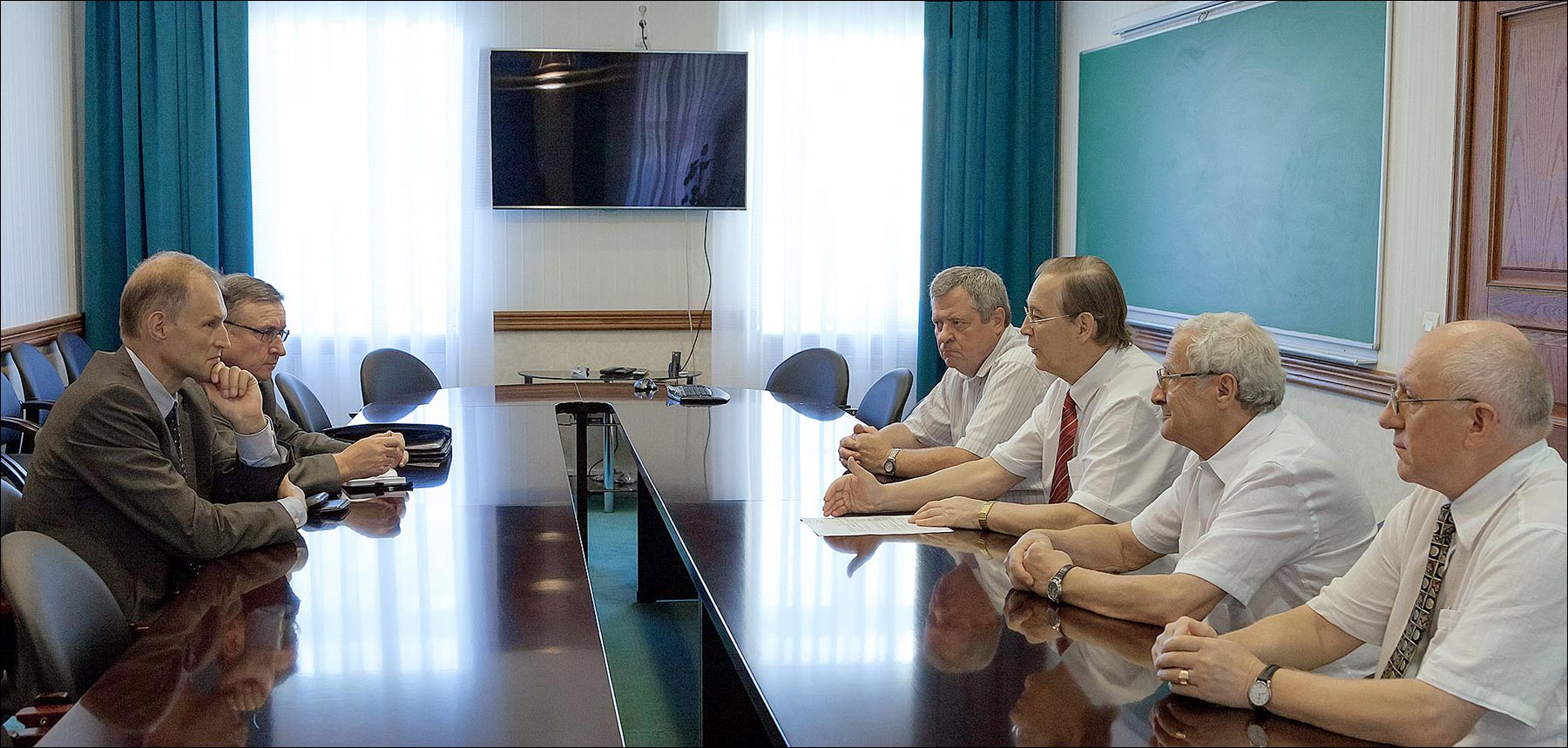Polish ambassador visits JINR
News, 03 August 2012
On 31 July, Extraordinary and Plenipotentiary Ambassador of the Republic of Poland to the Russian Federation Wojciech Zajączkowski, and Advisor to the Embassy K. Kordasch visited the Institute. The guests were greeted by JINR Director V.A. Matveev, JINR Vice-Director M.G. Itkis, JINR Chief Scientific Secretary N.A. Russakovich, Head of the National Group of Polish employees at JINR W. Chmielowski.
V.A. Matveev spoke about modernization of the JINR basic facilities.The Institute is now in the process of transition to a new state of its basic facilities. A complex of engineering and construction work on the NICA project with an estimated cost of 35 million euros is expected, for which a General Contractor will be found through an international tender. All JINR Member States were informed about this project through their plenipotentiary representatives. Seven organizations with working experience acquired in Russia have already announced their intent to participate in the tender: one Austrian-Slovak company, as well as Polish, Russian and Czech companies.
Wojciech Zajączkowski informed JINR leadership about the situation with Poland’s membership in the Joint Institute, tension of which has slightly decreased: “I think the issue will be resolved in favour of Poland’s presence in JINR. We do not have financial problems with payment of the membership fee. It is of great importance to continuously inform the Polish Ministry of Sciences about achievements of JINR, its place in international science and about work of Polish physicists here.” Such information has not sufficiently been provided to the Ministry of Foreign Affairs and to the Ministry of Science and Higher Education of Poland.
However, there are positive steps as well: after the recently held successful “Czech Days” in JINR and “JINR Days” in the Czech Republic, similar events are planned to be held in Poland. According to W. Chmielowski, officials of the Ministry of Foreign Affairs have already got acquianted with information booklets on Poland’s participation in JINR. An illustrated book on this subject is being prepared for publication.
JINR Vice-Director M.G. Itkis invited Ambassador to visit Moscow House of Scientists in the frames of the meeting on 24 October devoted to the inauguration of two new elements of the periodic table, namely Flurovium and Livermorium. JINR representatives, their research colleagues from the United States, and members of the International Union of Pure and Applied Chemistry will participate in the meeting. N.A. Russakovich outlined to Polish diplomats the process of JINR’s joining European scientific processes. V.A. Matveev mentioned that CERN leadership has been developing the idea of partnership with JINR at various forums, and highlighted mutual interests of the two research centers in their development. Relevant agreements on bilateral cooperation were concluded.
W. Zajączkowski was also interested in various opportunities for training young researchers available at JINR. When he learned about the schools for teachers of physics that took place in JINR and in CERN, he immediately specified whether Polish teachers participated in them. “Of course, they did,” – W. Chmielowski replied. “As for visits to JINR of students and school and colleage teachers, Poland is a leader: only this year three groups of 14-16 high school students and their teachers visited JINR. For students who have won different physics Olympiads, this trip was an award. Students of Polish universities have been participating in summer international practices for several years getting acquainted, among other things, with work of Polish researchers in different laboratories of the Institute.”
W. Chmielowski highlighted: “Thanks to this, today 28 Polish scientists at JINR are young people, and three others are prominent scientists following whose the Polish scientific school is being formed at the Joint Institute for Nuclear Research.”
Wojciech Zajączkowski said to the JINR Weekly Newspaper «Dubna»:
– I believe that presence of Polish scientists in Dubna is important for Polish-Russian contacts in the scientific aspect. It is useful in terms of opportunities available here for young people to write their graduation theses and to defend them. Such contacts need to be evaluated according to their content, and such content is the most important issue in our situation.
Olga Tarantina, photo by Pavel Kolesov
